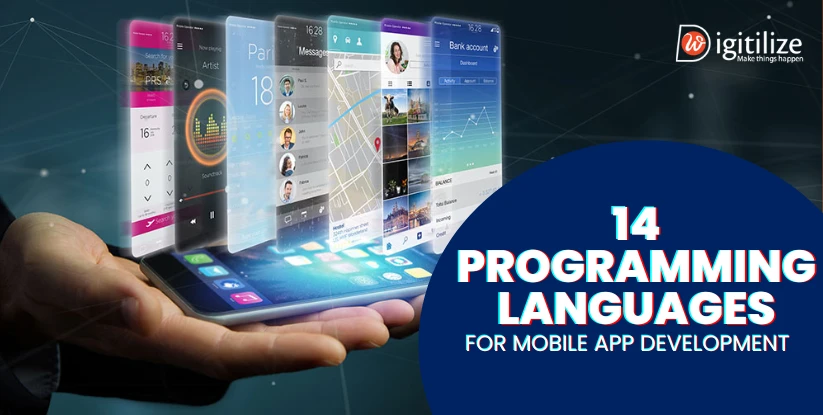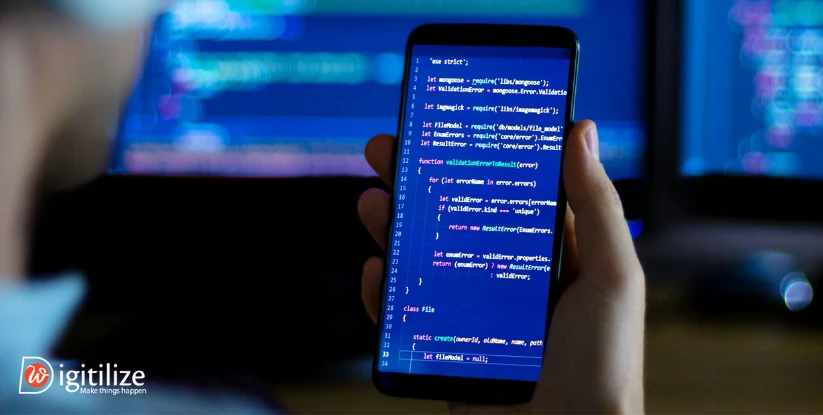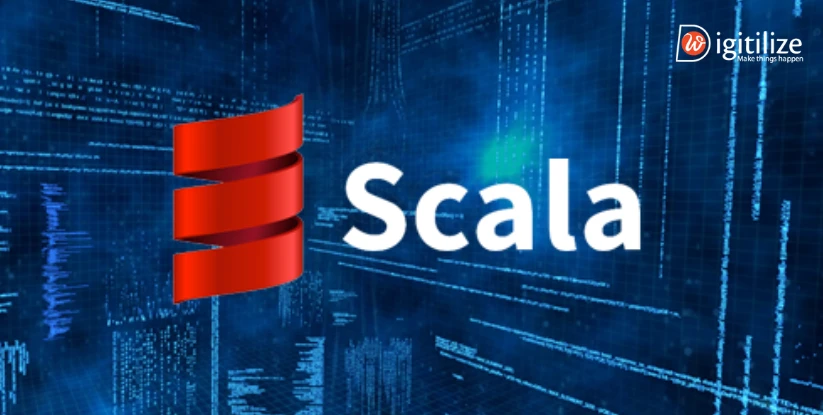14 Programming Languages for Mobile App Development

A common language for developing mobile applications does not exist. The explanation for this is that a lot relies on your objectives. This implies that before selecting the appropriate best coding languages for apps, you must decide what your objectives are. To assist you in understanding the most widely used 14 programming languages for mobile app development, we have produced this reference.
Nowadays, there are over 700 languages available for developing mobile apps, particularly with the rise of low-code frameworks. To create the path that leads to their achievement, the developers explore and employ various top programming languages UK 2024. Among other advantages, these programming languages can offer features and UI customisation that low-code app development frameworks cannot. Hence, read our article on the top 14 programming languages for creating mobile applications.
Type of Mobile app
We only want to briefly go over the various approaches to app development from a code standpoint before moving on to the top 14 programming languages for creating mobile applications. Expert recommendations for mobile development languages may often create apps in one of these three categories:-
Native App
-
Hybrid app
The distinction between native and hybrid applications is the most frequently brought up subject in conversations about mobile application development. For a considerable amount of time now, developers have been debating this extensively.
-
PWA app
Top 14 programming languages for mobile app development

-
Java
Mobile app development is only one of the many uses for Java, a popular and adaptable programming language. It is a popular option for mobile app development because of its scalability, platform independence, and the abundance of libraries and tools accessible to Java developers. It is extensively uses for creating Android apps. The vibrant and sizable developer community that surrounds Java is one of the main advantages of choosing it for mobile app development. -
Objective-C
Originally created in the early 1980s, Objective-C is an object-oriented Programming Languages for mobile app development. This is one of the most common and most used languages out of 14 programming languages for mobile app development. App development for Apple’s macOS and iOS operating systems is its main usage. Before Swift was released in 2014, Objective-C was the main programming language uses to create iOS apps. To support older iOS devices and preserve legacy codebases, it is still commonly utilise. -
Python
Developing mobile apps is possible using Python, a well-liked programming language. Although it is not as popular mobile development languages as other languages like Java and Swift for creating mobile apps, it still has a number of advantages that make it a desirable choice for some developers. Since it is an interpreted language, an interpreter uses it to execute commands instead of compiling them into machine code. This is one of the most common and most used languages out of 14 programming languages for mobile app development. This facilitates the speedy authoring and testing of code, which may be quite helpful for creating mobile applications. Python is an excellent language for novices as it also has an easy-to-read syntax. -
Kotlin
Modern, open-source Kotlin programming language is becoming more and more popular, especially for developing mobile apps for Android. The developer of the IntelliJ IDEA IDE, JetBrains, built it intending to make it safer, more expressive, and more succinct than Java—the language that is often used to create Android apps. This is one of the most used best languages for mobile apps 2024 out of 14 programming languages for mobile app development. The fact that Kotlin and Java can work together fluidly implies that developers may utilise both languages in the same project, which is one of its key languages for mobile apps advantages. -
Ruby
The creation of online and mobile apps frequently uses Ruby, a dynamic, object-orient programming language. It is popular for being straightforward, simple to use, and having a large following. Ruby has several applications in the field of mobile app development. Using Ruby on Rails, a web application framework based on Ruby, is one popular method. -
PHP
Server-side programming languages such as PHP are used to have low-cost web design services UK. Apart from that, for iOS and Android, mobile apps are often written in native programming languages like Java and Swift/Objective-C. A mobile application’s backend must use PHP to handle operations like data processing, retrieval, and storage. PHP is one of the 14 programming languages for mobile app development. -
Rust
The primary goal of the computer language Rust was to enhance system-level programming. Since then, though, its use has expanded to include mobile app development, among other fields. It is a mobile app development language that prioritises concurrency, speed, and security, which makes it perfect for creating high-performance, low-level applications. This is one of the most used languages out of 14 programming languages for mobile app development. Rust is capable of creating both the front end and back end of mobile applications. -
Scala

With support for both functional and object-oriented programming paradigms and interoperability with pre-existing Java libraries and frameworks, Scala is a potent and versatile language for creating mobile applications. Support for functional programming, which enables programmers to produce code that is simpler to understand, less error-prone, and more succinct, is one of Scala’s primary advantages. Moreover, Scala facilitates object-oriented programming, enabling programmers to create code that is more modular and simpler to maintain. -
HTML5
When developing web-based mobile applications, HTML5 is really helpful. Multimedia compatibility, multi-platform capabilities for various devices and applications, and rapid market implementation are among the features of HTML5’s most recent version. Because HTML5 is flexible and can be used quickly, makers of applications for Android and iOS find it very helpful. -
SQL
Relational databases are manages and manipulate by mobile app developers using SQL (Structured Query Language). SQL is useful in mobile app development since databases are frequently use to store and retrieve data. This is one of the best languages out of 14 programming languages for mobile app development. When creating a mobile app programming UK that needs data storage, SQL can establish and maintain the required database. Which SQL statements are uses to create the database and its tables will depend on the particular requirements of the application. -
Dart
Dart is Google’s programming language use in server, browser, and mobile applications. In addition to being straightforward, effective, and expressive, it is excellent for developing mobile apps. This is very useful for creating mobile applications with Google’s own Flutter framework. Using a single codebase, developers can create natively built desktop, web, and mobile apps using Flutter, a UI toolkit. -
Haskell
You may create mobile apps with Haskell, a functional programming language. It is renowned for having excellent static typing, type safety, and expressive power. Having existed since the late 1980s, it has lately become more well-known, especially in the fields of academia and research. The Haskell programming language’s capability for pure functions and immutable data structures is one of its main advantages for creating mobile apps. -
XML
One markup language is XML. Because it presents different parts and explains data, it helps develop Android apps more easily. In order to choose the font, colour, and all of the default texts, it is helpful to precisely arrange the layout buttons and pictures. This is one of the best languages out of 14 programming languages for mobile app development. Additionally, it guarantees that the encoded documents are in a set that both computers and people can readily read. XML is a data storage and transport format that is quite similar to HTML. -
C++
Java should be avoided in favour of C++ as it is less portable and has a larger memory footprint. Building Android apps is made easier using C++ as well as iOS apps. We have included it twice in our list for this reason. This is one of the best languages out of 14 programming languages for mobile app development. With the Android NDK toolkit, you can write native C++ code. In addition, it is a superset of C and can build almost any C programme. You can reuse the C programme in the future based on your needs.Top factors to consider while choosing the app development language.

Selecting the language should take these elements, as well as the specific requirements and specifications of the mobile application into consideration. Several considerations should be made while comparing mobile app development languages for developing mobile apps, including:-
Check the platform
-
Performance
-
Time and cost
-
Future maintenance
-
Community
Though it’s still a mess, you should speak with professional mobile app developers in UK about which programming language is best to learn for creating apps. -
FAQ
Frequently Asked Questions
JavaScript, when used with frameworks like React Native, enables developers to use their web development skills to build mobile apps. This can lead to faster development cycles and the ability to share code between web and mobile projects.
Java has been a traditional language for Android development. It is an object-oriented language that runs on the Java Virtual Machine (JVM) and is used for building robust and scalable Android applications.
While Python is not commonly used for native mobile app development, frameworks like Kivy and BeeWare allow developers to build mobile apps using Python. These frameworks facilitate cross-platform development, enabling deployment on iOS and Android.
Yes, there are several no-code and low-code platforms available that allow individuals with minimal coding skills to build mobile apps. These platforms provide visual interfaces, drag-and-drop elements, and pre-built components, reducing the need for traditional programming. However, for more complex and customized applications, traditional coding may still be necessary.
Yes, machine learning (ML) can be integrated into mobile apps. Languages like Python, with popular ML libraries like TensorFlow and PyTorch, are often used for developing machine learning models. Mobile app developers can leverage these models through frameworks.
Future-proofing mobile app development involves selecting languages with active communities, good support, and flexibility.



